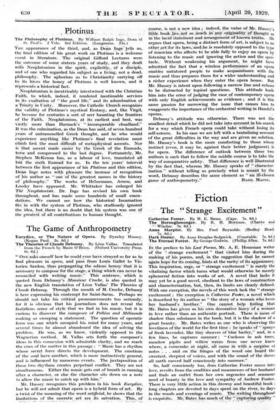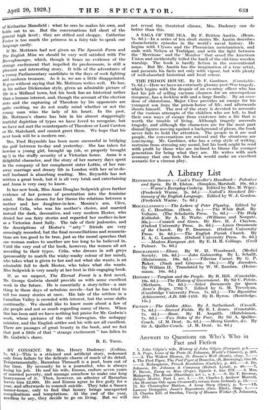Fiction
The `,` Strange Excitement-"
Catherine Foster. By H. E. Bates. (Cape. 7s. 6d.) The Boroughmonger. By R. H. Mottram. (Chatto and
_- is. 6d.)
Dark Hester. By Anne Douglas Sedgwick. (Constable. 7s. 6d.)
The Eternal Forest. By George Godwin. (Phillip Allen. 7s-.
Ix the preface to his Last Poems, -Mr. A. E. Housrnan writes of the strange excitement " that visited him during the making of his poems, and, in the suggestion that he cannot again hope for its, conning, hints at the rarity-of its appearance. This inspiration, urge, or " strange-excitement 7 is surely the vitalizing factor which turns what would otherwise be merely ephemeral fiction into works of art. A novel that lacks it may yet be a good novel, obedient to the laws of construction and characterization, but, then, its limits are clearly defined. With one exception, the novels of this week lack the "strange excitement ; the exception is Catherine Foster, a novel which is described by its author as " the story of a woman who loves her husband'sbrother." One ...cannot help feeling that Air. Bates has given us his own decorative- fancy of a woman in love rather than an authentic portrait. There is more of shadow than substance in the book, but it is the shadow of a great beauty. Mr. Bates writes as one who is observing the loveliness of the world for.the first time : he speaks'of ", sprays of fresh lavender, like tiny sheaves of blue barley," and, in a few lines, he captures summer : " Cuckoos in ash trees, meadow pipits and willow wrens from one never knew where, a corncrake at night, all came in with surprise of notes . . . and. on ,the fringes of the wood- one heard the sweetest, sleepiest of voices, and with the sound of the doves all earth moved half consciously into summer."
So, half consciously too, does Catherine Foster move into love, revolts from the crudities and meannesses of her husband and finds an outlet from her own urgencies and sensuous need of beauty in the love and sympathy of Andrew Foster. There is very little action in this drowsy and beautiful book : long chapters are devoted to days spent on the river, to days in the woods and evenings of music. The writing throughout is exquisite. Mr.' Bates has much of the "'capturing quality " of Katharine Mansfield : what he sees he makes his own, and holds out to us. But the conversations full short of the general high level ; they are stilted and choppy. Catherine Foster is too much the princess in a fairy tale to speak our language easily.
If Mr. Mottram had not given us The Spanish Farm and The English Miss we should be very well satisfied with The Boroughmonger, which, though it bears no evidence of the strange excitement that impelled its predecessors, is still a pleasant and interesting story. It tells of the adventures of a young Parliamentary candidate in the days of cock fighting and nankeen trousers. As it is, we are a little disappointed. It goes without saying that Mr. Mottram writes well. He has, in his rather Dickensian style, given an admirable picture of life in a Midland town, but his book has an historical rather than a human interest, and, though the account of the election
riots and the capturing of Theodore by his opponents are quite exciting, we do not really mind whether or not the young man wins the lady of his heart. In the past, Mr. Mottram's charm has lain in his almost staggeringly truthful depiction of types we have loved to recognize, but we have not met the counterparts of Theodore or Lord Carston or Mr. Statchard, and cannot greet them. We hope that his next book will be a modern one.
Mrs. Fred Reynolds has been more successful in bridging the gulf between to-day and yesterday. She has taken for heroine a young girl, brought up (oh, so properly brought up !) in the stuffy security of a Victorian home. Anna is a delightful character, and the story of her nursery days spent in the company of her complacent sister Lottie, of her run- away marriage and dreary life in London with her ne'er-do- well husband is absorbing reading. Mrs. Reynolds has not written a great book, but it is all very brisk and entertaining and Anna is very easy to know.
In her new book, Miss Anne Douglas Sedgwick gives further evidence of her powers of penetration into the feminine mind. She has chosen for her theme the relations between a mother and her daughter-in-law. Monica's son, Clive, rejected Celia, who was his mother's choice, and married instead the dark, decorative, and very modern Hester, who denied her son fairy stories and regarded her mother-in-law as a Victorian Aunt Sally. The tale of their jealousies, and the descriptions of Hester's " arty " friends are very amusingly recorded, but the final reconciliations and renuncia- tions are too good to be true, just as the moral speeches that one woman makes to another are too long to be believed in. Until the very end of the book, however, the women all act according to their types. Celia, who dresses in soft greys (presumably to match the wishy-washy colour of her mind), who takes what is given to her and not what she wants, is ail admirable foil to dark Hester, who takes what she wants. Miss Sedgwick is very nearly at her best in this engaging book.
If, as we suspect, The Eternal Forest is a first novel, Mr. George Godwin should- provide us with some excellent work in the future. He is essentially a story-teller-a rare thing in these days of nebulous novels-but he has tried to tell too many stories at once. His tale of the settlers in a Canadian Valley is crowded with interest, but the scene shifts continually. We should like to know more about a few of the people and not so much regarding many of them. When this has been said we have nothing but praise for Mr. Godwin's work, whose pictures of the old Norwegian, the unhappy minister, and the English settler and his wife are all excellent. There are passages of great beauty in the book, and we feel that just a little of that " strange excitement " has fallen to Mr. Godwin's share.
B. E. TODD.

























































 Previous page
Previous page